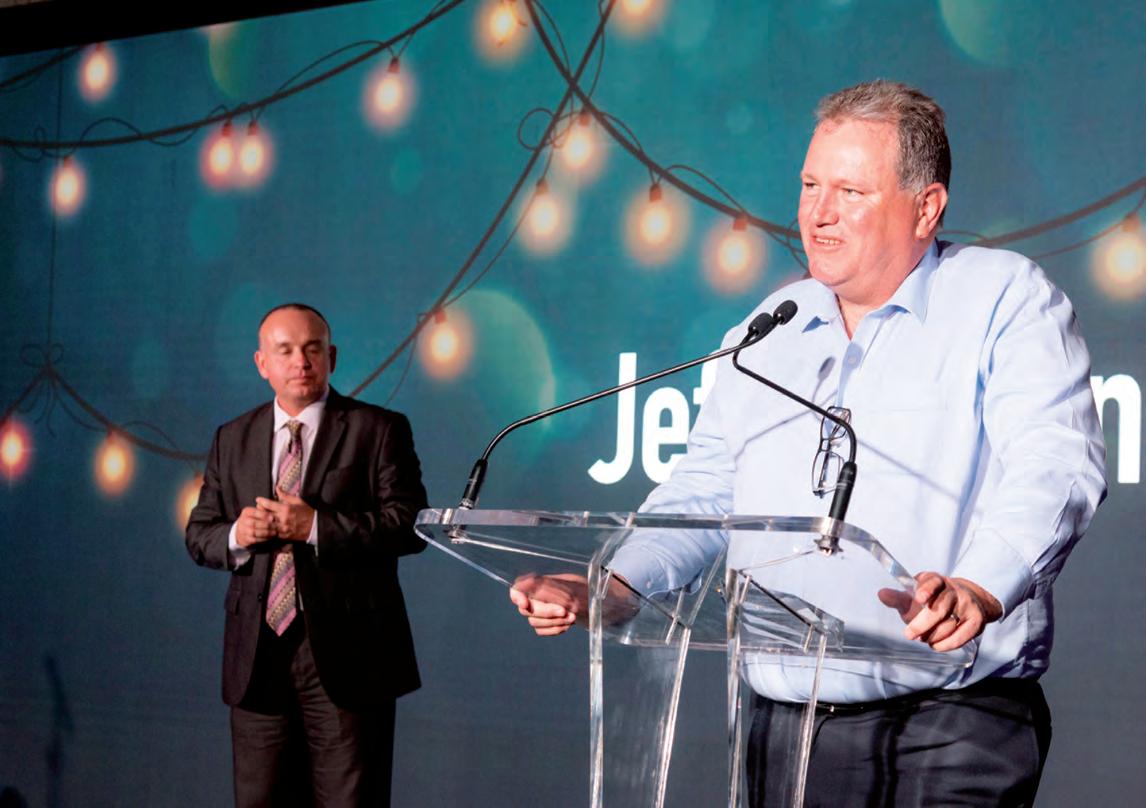
5 minute read
Importance of sound financial advice
PREPARING FOR THE POST DELTA UPLIFT
After a nervous and slow start to 2021, essential industries such as construction and infrastructure drove the economic recovery with the crane sector being a major beneficiary. Then, the Delta strain emerged mid-year with shutdowns and further border closures bringing the industry to a grinding halt. Jeff Wilson, senior partner equipment finance with Finlease, examines the positives businesses can take from the lessons learned, and how many will be able to benefit the bottom line.
“AS IS USUALLY THE CASE WITH ARTICLES,
these words are penned a month or so before they are read. This story is written in the second week of August and we are surrounded by the significant challenges of an escalating Delta pandemic. Nonetheless, this is written with cautious optimism. It is hoped we will see vaccination rates reach the 70 to 80 per cent coverage, within Australia, by Christmas. Health experts tell us this percentage will provide the stability for life and the economy to return to an adjusted normal,” said Jeff Wilson, senior partner equipment finance with Finlease..
“In so many ways, this pandemic is like a particularly bitter winter. A winter which has claimed the lives of far too many as well as significantly damaging or destroying many businesses particularly in vulnerable industries. In our view, we should view this period in the knowledge that every winter is followed by spring and spring brings new hopes and aspirations.
“As we look at the landscape, we can see many large and small projects have been delayed and the work needed to conclude them is behind schedule. This means pent-up demand is there. For me, the key question ‘is how many businesses are ready for the spring? And if they are not, what do they need to do to be prepared?’ As our discipline is finance, I will restrict my observations to this area,” he said.
WHAT DO WE KNOW AT FINLEASE?
The ongoing demand for so many industries, including the mobile crane industry, is there, and has been increased as a function of these COVID-induced delays says Wilson.
“The Federal Government has provided significant tax incentives for businesses to invest and expand. The significant incentives are in place until June 30, 2023 and represent a once in a generation opportunity. Money has never been so cheap and typically, equipment finance interest rates are at record lows.
Wilson said overseas economies are starting to recover, production of machinery and yellow goods, including mobile cranes will increase. International freight movements will expand and so the equipment required will start hitting our shores in increased quantities.
So, what do businesses need to do to be ready to upgrade and increase their current machinery equipment base? Finance will need to be secured. Wilson believes this should be done by obtaining the best all round deals which have acceptable terms and conditions for the debt.
In order to secure the best outcomes, businesses should consider the following: 1. During this winter, avoid any premature deferment of existing finance payments if possible. With many of our clients, we can see they are currently a little uncertain about the existing business landscape, but many have good cash reserves off the back of a solid 2021 trading year.
In the event this winter goes longer than anticipated and cash looks to be getting tight they can always seek those deferrals in coming months. 2. Fast track the production of the
Jeff Wilson, senior partner equipment finance for Finlease (right).

2021 formal financial accounts. This does not mean a business needs to submit tax returns as these are not typically due until April or May of next year. However, there may also be a benefit to table those tax returns early in the event they have acquired a significant amount of equipment in the 2021 financial year. As a result of the government initiatives, the acquisition of equipment could have provided significant tax benefits, which may also provide a tax refund windfall through the tax carry back opportunities on any tax paid in the 2019 and/or 2020 financial year. 3. Wherever possible keep their BAS and quarterly tax payments up to date. A company showing good trading results in 2021 (ignoring any tax benefits from the government incentive), with no deferred finance payments and ATO portals which are up to date, maximises their chance to obtain the best finance outcome on major equipment acquisitions in the future.
“When COVID first hit our shores back in January 2020, we saw our country start lockdowns and history has shown this was proven to be the correct decision. Everyone was nervous and unsure of the future including big and small business, governments both local, state, and federal, our parents, grandparents, and our children. No one really understood the full impact and there was a willingness by everyone to follow orders. We saw both our financial institutions and governments offering varying levels of financial support providing us all with some levels of comfort and stability. “Today, some 18 months later we find ourselves dealing with the Delta strain of COVID and this time around we have the same feelings of nervousness. This nervousness is not for the lack of work waiting for our return, we are nervous about the amount of time it will take before we can resume our prior ‘normal lives’.
“The government is making it clear that our way forward is via vaccination and with more vaccinations comes more freedom and to this point the vaccination rates are ramping up. If businesses look to ensure they have followed the steps above, it will certainly put them in the best position to take full advantage of the opportunities that certainly lie ahead,” said Wilson.










